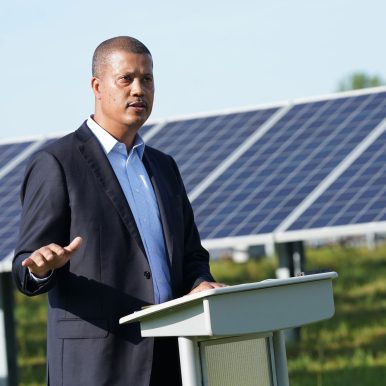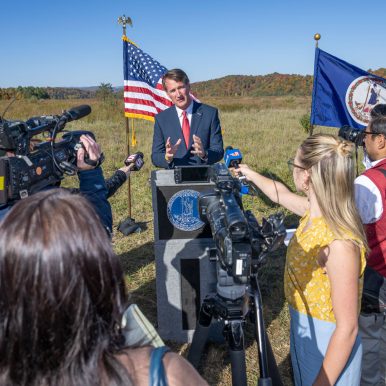CENTRAL VIRGINIA
Henrico County-based Altria Group Inc. has entered into a definitive agreement to acquire e-vapor maker NJOY Holdings Inc. for approximately $2.75 billion in cash, with a potential additional $500 million in payments, Altria announced March 6. Part of the deal’s funding will come from an expected $1.7 billion payment plus interest from Philip Morris International Inc. by July. The announcement follows Altria ending its noncompete deal with Juul Labs Inc. in September 2022. Altria invested $12.8 billion in e-cigarette maker Juul before Juul faced lawsuits and possible bankruptcy over allegations it marketed its products to teens. In a deal effective March 3, Altria exchanged its investment in Juul, worth $250 million on Dec. 31, 2022, for heated tobacco intellectual property. (VirginiaBusiness.com)
A Texas-size travel center could be coming to New Kent County. Buc-ee’s filed a conditional use permit with the county’s planning and zoning department for review and approval of a proposed sign, the county’s economic development department announced March 6. Plans include a 74,000-square-foot store with 120 fueling positions, 557 parking spaces, 24 Tesla electric charging stations and more at Exit 211 off Interstate 64. The location would be the Texas-based convenience store chain’s first in Virginia, and its anticipated 2027 opening is timed for completion of an ongoing project to widen Interstate 64. (VirginiaBusiness.com)
Richmond City Council on Feb. 27 approved $3.5 million for repairs at The Diamond, despite a new stadium being two years away. The city is mandated by Major League Baseball to bring the stadium, which is home to the Richmond Flying Squirrels, the city’s minor league team, up to league standards in time for its April 7 opening day. The stadium needs a second enclosed batting and hitting tunnel, renovated locker rooms and roof repairs. The stadium is being replaced as part of Richmond’s Diamond District redevelopment project. (Richmond Times-Dispatch)
SanMar Corp., the United States’ largest supplier of wholesale printable accessories and apparel, will invest at least $50 million to establish distribution operations in Hanover County and create an expected 1,000 jobs, Gov. Glenn Youngkin announced March 9. SanMar’s operations, in a 1.1 million-square-foot building in the East Coast Commerce Center, will be the Washington-based company’s largest facility as well as its East Coast flagship. The company expects to be fully operational in its new building within a year to 18 months. (VirginiaBusiness.com)
Wegmans is asking the Virginia Supreme Court to rethink a decision that could impact its $175 million distribution center nearing completion in Hanover County. The state Supreme Court ruled in February that a Hanover County Circuit Court erred when it decided homeowners did not have standing to sue the Board of Supervisors, which approved a special use permit allowing Wegmans to build off Sliding Hill Road. Wegmans was later added as a defendant in the case. The Supreme Court voted unanimously to remand the suit back to Hanover. Wegmans asked the Supreme Court on March 7 to either rehear arguments or amend the opinion sent to the lower court. (Richmond Times-Dispatch)
PEOPLE
 Teri Gendron succeeded Jeremy Noble as Markel Corp.‘s chief financial officer on March 20.Noble became president of the Glen Allen-based Fortune 500 insurance and investment firm’s insurance operations earlier this year. Gendron will oversee and manage the holding company’s financial operations across its three divisions: insurance, investments, and Markel Ventures. Gendron most recently served as CFO for New York-based investment bank and capital markets firm Jefferies Financial Group Inc. Markel has about 20,300 employees and reported $11.67 billion in 2022 operating revenue, down from $12.84 billion in 2021. Its total 2022 assets were $49.79 billion. (VirginiaBusiness.com)
Teri Gendron succeeded Jeremy Noble as Markel Corp.‘s chief financial officer on March 20.Noble became president of the Glen Allen-based Fortune 500 insurance and investment firm’s insurance operations earlier this year. Gendron will oversee and manage the holding company’s financial operations across its three divisions: insurance, investments, and Markel Ventures. Gendron most recently served as CFO for New York-based investment bank and capital markets firm Jefferies Financial Group Inc. Markel has about 20,300 employees and reported $11.67 billion in 2022 operating revenue, down from $12.84 billion in 2021. Its total 2022 assets were $49.79 billion. (VirginiaBusiness.com)
EASTERN VIRGINIA
Aldora, a manufacturer of architectural glass, including mirrors, shower doors and custom commercial products, opened a 72,000-square-foot facility in Newport News in February. Aldora’s fabrication and distribution facility at 280 Enterprise Drive employs 75 people and will provide tempered, fabricated and insulated glass products to customers within a 150-mile radius. Aldora’s seventh location in the mid-Atlantic and Southeast, its services will reach fabricators from Roanoke north to Baltimore and south to Raleigh, North Carolina. The expansion helps provide more assistance and reduced wait times for customers working on design and construction projects. (Inside Business)
More rough times are ahead for the Newport News/Williamsburg Airport, which will soon lose service from Avelo Airlines — one of two airlines operating out of the regional hub. Avelo notified the Peninsula Airport Commission that it would discontinue service from the airport after April 16. Avelo’s announced departure comes days after the airport’s commission voted to fire Executive Director Mike Giardino. The commission hoped changing leadership would help bring more commercial air service to the struggling airport. (Daily Press)
Princo LLC, a joint venture comprised of health care companies Premier Inc., Vario Labs LLC and Caretrust LLC, will invest up to $23.8 million to establish a health care products manufacturing facility in Norfolk, creating an expected 284 jobs, Gov. Glenn Youngkin announced Feb. 21. Princo will initially invest $18.1 million, with the potential to invest another $5.7 million. The 80,000-square-foot facility, located in the Norfolk Industrial Park, will manufacture incontinence pads that are used by more than 4,400 hospitals and other health care providers around the country. The project moves the production of the pads from Southeast Asia to the United States. (VirginiaBusiness.com)
Residents who are suing to overturn Suffolk‘s rezoning for the Port 460 Logistics Center project filed a brief March 2 arguing they have standing to pursue their case. Dale Roberts, Gerard Celia and Sterling Taylor filed suit in Suffolk Circuit Court in October 2022 seeking to block City Council’s decision to rezone property for development of the logistics center at 2925 Pruden Blvd. The new brief responds to the city’s contention that the residents do not have standing to challenge the rezoning ordinance, along with arguments that the action was “unreasonable and arbitrary” and should be heard by the court. (Suffolk News-Herald)
Relatives of four people shot to death in Virginia Beach city offices in 2019 traveled to the Virginia State Capitol on Feb. 22 to press for a $40 million award from the state, saying the city has failed to provide for the families of the 12 people killed and the municipal employees physically and emotionally scarred by the massacre. The families met separately with Gov. Glenn Youngkin, Lt. Gov. Winsome Earle-Sears and legislators, telling them the city cut off their medical and mental health benefits just before the second anniversary of the shooting. Contending that city officials have failed them, the families want state government to step up, said former Lt. Gov. Justin Fairfax, who represents families of seven of the 12 people killed. (The Washington Post)
PEOPLE
In February, Suffolk-based TowneBank promoted two presidents to new roles and appointed a president for its new region. Robin Cooke now serves as president of retail banking. She was formerly president of the Portsmouth/Suffolk region. C. Ross Morgan will fill that role in addition to serving as president of TowneBank’s Real Estate Finance Group. TowneBank’s $56 million acquisition of Windsor-based Farmers Bankshares Inc., the parent company of Farmers Bank, closed in January. Once the Farmers Bank division moves under the TowneBank name in April, Thomas Woodward will become president of TowneBank’s new Suffolk and Western Tidewater region. (VirginiaBusiness.com)
NORTHERN VIRGINIA
Aerospace defense contractor Amentum Services Inc. is consolidating its operations and moving its headquarters from Germantown, Maryland, to Chantilly, a move that will add 157 jobs, Gov. Glenn Youngkin announced Feb. 27. The move across the Potomac River includes an investment of $495,000. The new headquarters consolidates operations at Amentum’s office at 4800 Westfields Blvd. Virginia competed with Maryland for the project. Amentum has more than 44,000 employees in 85 countries. (VirginiaBusiness.com)
Tysons-based meetings and events software company Cvent Holding Corp. agreed in March to be acquired by New York-based private equity firm Blackstone in a deal valued at about $4.6 billion. Under the agreement, Cvent stockholders will receive $8.50 per share in cash as the company becomes privately held once more. In December 2021, Cvent went public after a $5.3 billion merger with a SPAC. (VirginiaBusiness.com)
Ashburn-based Fortune 500 IT company DXC Technology Co. was penalized by the federal government March 14 for making “misleading” financial reports from 2018 to early 2020, according to the U.S. Securities and Exchange Commission. DXC did not admit or deny the charges, but consented to a cease-and-desist order and agreed to pay an $8 million penalty. (VirginiaBusiness.com)
District of Columbia Superior Court Judge Yvonne Williams dismissed part of a lawsuit by D.C.’s attorney general that alleged that MicroStrategy Inc. Executive Chairman Michael J. Saylor failed to pay city income taxes for years. Williams ruled the city failed to meet the criteria to bring a claim under D.C.’s False Claims Act, under which Saylor could have been held liable for as much as $150 million. The city can still pursue seeking $25 million in alleged unpaid taxes, interest and penalties it contends Saylor avoided by claiming to live elsewhere while actually residing in the District. Saylor, who co-founded the Tysons company best known as the largest corporate bitcoin holder, says he is a resident of Florida and denies any wrongdoing. (VirginiaBusiness.com, The Washington Post)
Scout Motors Inc., a Tysons-based electric vehicle manufacturing spinoff of German automaker Volkswagen AG, said March 4 that it will build a $2 billion manufacturing plant near Columbia, South Carolina. The company is led by former Volkswagen North American Region President and CEO Scott Keogh, also former president and CEO of Reston-based Volkswagen Group of America Inc., who left those posts in August to oversee the launch of the new company with a $100 million  investment from its German parent. Scout aims to launch electric SUV and pickup truck models in late 2026. Scout is currently based out of a WeWork location in Tysons. (Washington Business Journal)
investment from its German parent. Scout aims to launch electric SUV and pickup truck models in late 2026. Scout is currently based out of a WeWork location in Tysons. (Washington Business Journal)
PEOPLE
Roger Krone, chairman and CEO of Reston-based Fortune 500 contractor Leidos, plans to step down from the company this year. Thomas Bell, chairman and CEO of Rolls Royce North America and president of Defense Rolls-Royce plc, will succeed Krone as CEO on May 4, Leidos announced Feb. 27. Krone has led the science and technology contractor since 2014 and will continue as an adviser through July. Bell, who will also join Leidos’ board in May, has led Rolls-Royce North America since 2018, as well as its global defense contracting division. (VirginiaBusiness.com)
ROANOKE/NEW RIVER VALLEY
State regulators in early March approved an average monthly residential bill increase of $20.17 for customers of Appalachian Power, the state’s second-largest electric utility, so that the company can recover increased fuel costs. The State Corporation Commission, which oversees the state’s public investor-owned utilities, approved the increase following the request from the utility in the fall, which initially sought a bill increase of $33.24 per customer before the company volunteered a mitigation plan. The approved increase had been in effect on a temporary basis since Nov. 1, 2022. The commission previously approved a fuel-factor increase of $14.93 in September 2022 for Dominion Energy Inc. and is also reviewing bill increases for natural gas customers amid rising supply costs. (Virginia Mercury)
German auto parts manufacturer STS Group AG will establish its North American headquarters in Salem, a $32 million investment expected to create 119 jobs, Gov. Glenn Youngkin announced March 9. In Salem, STS Group North America will supply commercial truck assembly components for Volvo Trucks in Pulaski County and other truck and automotive facilities in the Midwest and Southeastern U.S. markets. The company will upfit 200,000 square feet of existing space and construct a 32,000-square-foot addition at the former GE Power facility, which stopped operating in 2019. (VirginiaBusiness.com)
Blacksburg-based Torc Robotics on Feb. 28 announced it will acquire Montreal-based computer vision company Algolux Inc. A purchase price was not disclosed. Torc, a self-driving truck company, is an independent subsidiary of Daimler Truck AG. Torc said in a news release that it is acquiring Algolux for its expertise in computer vision and machine learning. Algolux focuses on machine learning tools and AI software products to advance driver assistance systems and autonomous vehicles. (VirginiaBusiness.com)
PEOPLE
The U.S. Senate voted March 7 to confirm Robert Ballou as the next federal judge for Western Virginia. Ballou, who has served as a magistrate judge based in Roanoke for the past 12 years, will succeed U.S. District Judge James Jones of Abingdon, who took senior status in August 2021. Ballou was backed by the Senate Judiciary Committee last year and received bipartisan support in a 59-37 floor vote. (The Roanoke Times)
The Highlander, a $40 million boutique conference hotel opening this spring in Radford, announced its senior leadership team March 1. The team includes General Manager Rachel Pegues; Executive Chef James Kirby; Director of Sales and Marketing Ginger Clark; and Director of Food and Beverage John O’Conner. The conference hotel will have 124 rooms, including four suites and a 4,000-square-foot conference space that will allow the university to host large-scale events it couldn’t accommodate previously. It will also feature a 2,750-square-foot indoor rooftop bar and restaurant with a 1,650-square-foot rooftop terrace. (VirginiaBusiness.com)
Saonee Sarker, a professor at Sweden’s Lund University, will serve as the next dean of Virginia Tech’s Pamplin College of Business following an international search. She has been a professor in Lund University’s Department of Informatics in the School of Economics and Management since 2021, and is also a visiting professor at the London School of Economics’ management department. Virginia Tech has also named a new dean to lead its College of Architecture, Arts, and Design (AAD) following an international search. Tsai Lu Liu will start July 1. He has led the Department of Graphic Design and Industrial Design at North Carolina State University in Raleigh since 2012 and has a background in industry and academia. (VirginiaBusiness.com)
SHENANDOAH VALLEY
Harrisonburg-based organic poultry producer Farmer Focus is planning a $17.8 million expansion that will create 300 jobs and double its processing capacity. Part of that expansion will be funded by a $3.6 million grant from the U.S. Department of Agriculture’s Meat and Poultry Processing Expansion Program (MPPEP). U.S. Secretary of Agriculture Tom Vilsack announced the grant during a visit to Farmer Focus’ headquarters on Feb. 21. Operating since 2014, Farmer Focus’ Harrisonburg chicken processing facility processes 335,000 chickens per week, but demand has grown, and the expansion will allow the company to process 630,000 chickens per week. (VirginiaBusiness.com)
Harrisonburg City Council voted 3-2 on Feb. 28 to approve the Bluestone Town Center, an 897-unit affordable housing project. The housing development will be located on 89 undeveloped acres at the corner of Erickson Avenue and Garbers Church Road. The Harrisonburg Redevelopment and Housing Authority partnered with investment and advisory firm EquityPlus to propose the project. Because it’s an affordable housing project, people with 80% of Harrisonburg’s median income would be eligible to rent there, according to Harrisonburg Housing Coordinator Liz Webb. Those with 80% to 120% of Harrisonburg’s median income would be eligible to purchase for-sale units. (Daily News-Record)
James Madison University alumni Angela and Carl Reddix made a $1.1 million commitment to support first-generation college students at their alma mater, the university announced Feb. 24. Founder, president and CEO of Norfolk-based ARDX, a health care management and IT consulting firm, Angela Reddix studied marketing at JMU and graduated in 1990. Her husband, Carl, studied management and graduated in 1988. Their gift establishes the Reddix Center for First Generation Students and the Reddix Centennial Scholarship Endowment. Angela Reddix’s mother was a first-generation college student, and Carl Reddix was as well. (VirginiaBusiness.com)
The former executive director of the Front Royal-Warren County Economic Development Authority, Jennifer Rae McDonald, is seeking to move her criminal trial out of Harrisonburg. Her attorney filed a motion in the U.S. District Court for the Western District of Virginia in late February seeking to transfer the jury selection and trial to the Charlottesville Division. McDonald faces seven counts of wire fraud, 10 counts of bank fraud, 16 counts of money laundering and one count of aggravated identity theft. A six-week trial was scheduled to begin May 15
in Harrisonburg. Federal authorities allege that McDonald used EDA money without permission to perpetuate schemes for her personal, financial benefit. (The Winchester Star)
Winchester City Council unanimously approved a conditional use permit on Feb. 28 for an affordable housing project in the city’s North End. The property owner, ZeroPak Development LLC — an investment and development group headed by former City Council President John Willingham — will convert the 120-year-old former ZeroPak apple processing and storage facility into an apartment building. City Council also approved a second conditional use permit allowing the developer to build apartments on the ground floor of the six-story building. The current design has 122 apartments, but the permit approves up to 132 units. (The Winchester Star)
PEOPLE
Rockingham County-based Soli Organic Inc. has hired former Tesla executive Jeff Jackson as its chief infrastructure officer, the indoor farming company announced Feb. 17. Jackson was the director of infrastructure for electric vehicle manufacturer Tesla Inc. At Soli Organic, he will support the strategic development of the company’s new facilities and infrastructure. Jackson spent more than seven years at Tesla and has held leadership roles in operations and facilities at Samsung Austin Semiconductor. He will be based on the West Coast but plans to regularly travel to Soli Organic’s Virginia headquarters. (VirginiaBusiness.com)
SOUTHERN VIRGINIA
Danville is set to receive nearly $1.2 million from the federal government to help improve access to affordable housing. The city will receive $853,443 from the Community Development Block Grant and $335,524 in HOME Investment Partnerships. The funding is part of about $98.3 million from the U.S. Department of Housing and Urban Development announced recently by U.S. Sens. Mark Warner and Tim Kaine for affordable housing, community development and homelessness assistance throughout the state. (Danville Register & Bee)
Danville-based pharmaceutical engineering and manufacturing company Engineered BioPharmaceuticals Inc. will invest
$6.1 million to expand from the Dan River Business Development Center into its first standalone manufacturing space, creating 34 jobs, Gov. Glenn Youngkin announced Feb. 1. Established in 2011, Engineered BioPharmaceuticals develops delivery and shelf-life stability technologies for pharmaceuticals, vaccines, supplements, and food and beverage products. The company’s first therapeutic product is a plant-based, zero-calorie gummy designed to combat hyperglycemia. (VirginiaBusiness.com)
GO TEC, a program that began in Danville and Pittsylvania County with a goal of developing interest in manufacturing careers among students, particularly middle schoolers, has received additional funding to support its expansion into other regions of Virginia. GO Virginia, a business-led state economic development initiative, awarded the program almost $3.5 million, and local and federal partner organizations provided an additional $2.4 million, making this the second largest award that GO TEC has received, said Julie Brown, vice president of advanced learning at Danville’s Institute for Advanced Learning and Research. (Cardinal News)
The Henry County Board of Zoning Appeals (BZA) on March 2 approved a request for a 20-megawatt solar farm in Ridgeway, to be built by Sunny Rock Solar LLC. After review, the board approved 97 acres for solar use to be located on 180 acres at the northeast corner of the intersection of Soapstone Road and Joseph Martin Highway, extending in a northeast direction in the Ridgeway District. The board approved the special use permit for construction of the solar farm on the agriculturally zoned land with eight additional conditions. (Martinsville Bulletin)
Sentara Halifax Regional Hospital may be considering replacing its 70-year-old building with a new facility — but it’s unclear what that would look like. Halifax Town Council member Jack Dunavant alleged in an open letter that Sentara plans to tear down the hospital and replace it with a walk-in clinic. In response, Sentara Halifax Regional Hospital President Brian Zwoyer offered assurances that Norfolk-based Sentara is committed to having an acute-care hospital serving Halifax County and the surrounding area. (SoVa Now)
South Boston Speedway is for sale, but the owners say they are “determined to only sell the speedway to another great steward” that will continue to keep it in operation, according to a statement issued by the track March 4. The statement comes after Mattco Inc. CEO Nick Igdalsky, who heads the family-owned NASCAR racing operation, told Sports Business Journal that the Mattioli family wants to focus on Pocono Raceway, the company’s flagship operation in Long Pond, Pennsylvania, hence the decision to explore a sale of South Boston’s short track. (SoVa Now)
PEOPLE
Diana L. Schwartz‘s title is changing from executive director to CEO of the River District Association, the Danville downtown revitalization association announced March 13. The title more accurately reflects her role, which, the RDA says, has shifted from creating and managing programs for the downtown business community to putting greater emphasis on growing local leadership, forming strategic relationships and serving as a community and economic development resource. The RDA Board of Directors hired Schwartz in 2017. Since then she has led the association’s growth from a staff of one person to five and overseen a tripling of its annual budget. (VirginiaBusiness.com)
SOUTHWESTERN VIRGINIA
Emory & Henry College will use a $2 million donation from The Bill Gatton Foundation to help construct a new equestrian center and boost its equine studies program. The private college announced the donation on Feb. 20. The Bristol, Tennessee, foundation’s lead gift for the project was to Emory & Henry’s Collective Connections Campaign, which has a $25 million goal, and is in memory of Carol Martin “Bill” Gatton. Gatton owned the Bill Gatton Automotive Group, which included dealerships across Alabama, Tennessee and Texas. Emory & Henry will name the indoor riding arena at its new center The Bill Gatton Grand Arena. (VirginiaBusiness.com)
Hard Rock Bristol will sponsor The Cameo Theater, which will rebrand its stage as the Hard Rock Stage. The entities announced the deal on March 1 but did not disclose specific details. Hard Rock now has a VIP suite upstairs at The Cameo where it can entertain guests. Theater owner Brent Buchanan bought the 1925-era facility in 2017, and it began holding live performances in 2021. Buchanan said he expected the facility to continue expanding its lineup to up to 60 annual live shows. (Bristol Herald Courier)
Baltimore-based convenience store and food service group Royal Farms plans to open its first Southwest Virginia locations this summer. A 4,700-square-foot store at the intersection of Commonwealth and Euclid avenues in Bristol and a site at the corner of Lee Highway and Falcon Place Boulevard are under construction. The company was hiring for its Bristol location in mid-February, with plans to hire between 35 and 40 workers. Along with the company’s customary full-service deli, the Bristol location will have a car wash, six fuel dispensers and eight Tesla charging stations. (Bristol Herald Courier, Bristol Now)
The proposed Southwest Virginia Healthcare Excellence Academy Laboratory School (SWVA-HEALS) received a $200,000 planning grant, announced Feb. 15, from the Virginia Department of Education. If the lab school receives final approval later this year, it will serve students in the 10th, 11th and 12th grades, with the goal of creating of a pipeline for health care professionals in Southwest Virginia. Emory & Henry College’s schools of health sciences and nursing are the lead institutions, and the initiative’s partners are the public school divisions of Bristol, Smyth, Washington and Wythe counties; the Southwest Virginia Higher Education Center; the A. Linwood Holton Governor’s School; and Virginia Highlands and Wytheville community colleges. (Cardinal News)
During its Feb. 17 meeting, the Virginia Coalfield Economic Development Authority‘s board approved several grants, including an award of up to $50,000 to help The Napoleon Hill Foundation, based at the University of Virginia’s College at Wise, to continue developing its online entrepreneurship course for high school students. The board also approved a $30,000 grant to the Wise County Industrial Development Authority for a project in the town of Appalachia that has not been announced. VCEDA also granted more than $88,800 to help Breaks Interstate Park develop infrastructure and improvements.
(The Coalfield Progress)
PEOPLE
The Southwest Regional Recreation Authority board, which runs the Spearhead Trails system, selected Scott County resident and former Virginia Division of Capitol Police Chief Anthony S. “Steve” Pike on Feb. 23 to serve as the authority’s interim executive director. Former Executive Director Melissa Rose resigned Feb. 3. Pike retired as chief of the Capitol Police in 2022 after 11 years. He began his law enforcement career in 1988 with the Virginia Department of Game and Inland Fisheries. (The Coalfield Progress)















